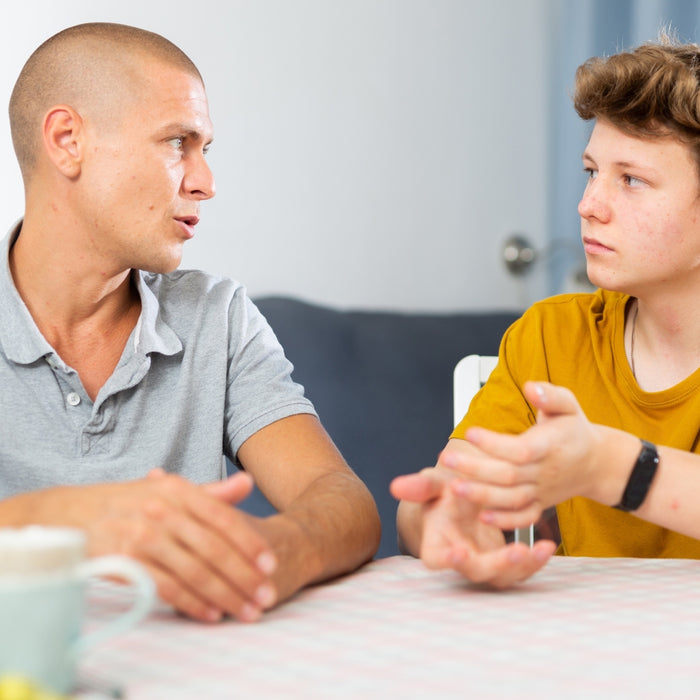
Listen to the article:

Is your kid acting up? Instead of reacting, try connecting first! Science has shown that children learn at their best when they feel a connection to you. That feeling of belonging and being significant is fundamental for sealing the connection. Without it, we can’t expect to be a good influence on them.
Connecting with your kids allows them to feel safe and open to accepting change. It’s important to lay this foundation first so that when correction needs to be implemented, it works. That’s not to say that you should let your kids run wild and give them everything they ask for.
Letting your kid know their loved though isn’t considered an overindulgence. You can’t say it enough, or love them enough. They soak it up like little sponges. Showing this love and creating that connection will bode well for the whole family.
Want to make the right connection? It’s never too late! Start with these tips to build your connection so you can make a positive correction and influence when needed.
- Spend time alone with your kids
If you have more than one child, make sure to spend time alone with each of them. It doesn’t need to be hours long or cost a thing. Take a walk just the two of you and keep your eyes off your phone to really connect.
- Listen to what they say
Every parent has mindlessly uttered, “Mmm-hmm,” while their child chats it up from the backseat of the car. Make sure that you set aside time to really listen to your child though. If it’s too difficult to be fully present while driving, make sure you pull up a chair and a healthy snack to share when you get home.
- Let them feel understood
Everyone is entitled to their feelings. Kids need to know that it’s ok to feel them. Validate their feelings to help connect to them. Remember, you have bad days and bad moods too. Kids need our guidance to help find healthy avenues for expressing feelings.
- Don’t drone on and on
Kids don’t want to hear our stories when we don’t listen to theirs. Be respectful when you listen to what they say if you expect them to listen to you.
- Create solutions together
Never, ever try to reason with your child while they’re angry. They need time to calm down. Once they are, sit down and discuss solutions together to solidify your connection.
Once you connect, you can work to correct. This is a team effort between you and your child. Instead of imposing punishments, you solve the problem together. A family meeting to jointly solve the problem involves your child and helps them to learn in a more positive way. Keep in mind that much of the misbehavior we see is a result of our children feeling like they don’t have that connection. By strengthening that bond, you’re bound to see much less negative behavior and enjoy a positive parenting experience with your child.
Thought Starters:
- Prioritizing One-on-One Time with Each Child: Consider how you can create opportunities for individual time with each of your children. Reflect on activities like taking a walk together or sharing a meal, where you can be fully present and attentive, fostering a deeper connection.
- Active Listening to Understand Your Child's Perspective: Think about ways to improve how you listen to your child. Contemplate setting aside dedicated time where you can give them your undivided attention, showing that you value their thoughts and feelings.
- Validating and Respecting Your Child’s Emotions: Reflect on how you can acknowledge and validate your child's feelings, even when they are experiencing negative emotions. Consider how you can empathize with their experiences and provide guidance in expressing their feelings in healthy ways.
- Collaborating on Solutions to Problems: Ponder on the approach of discussing and solving problems together with your child once they are calm. Think about how collaborative problem-solving can strengthen your bond and lead to more effective behavior correction.
- Fostering a Stronger Emotional Connection to Reduce Misbehavior: Reflect on the relationship between a strong emotional connection with your child and their behavior. Consider how nurturing this connection can lead to a decrease in negative behavior and a more positive parenting experience.
Suggested Questions To Ask Your Child:
- Would you like to spend some time together doing something you enjoy?
This question aligns with the article's suggestion to spend one-on-one time with each child. It's aimed at creating opportunities for bonding and connection, which is crucial before addressing any misbehavior.
- Can you tell me more about how you're feeling right now?
Asking about the child's feelings and actively listening to their response is recommended in the article. This question shows the child that their emotions are valid and important, which helps to establish a connection.
- What do you think would be a good solution to this problem?
This question encourages collaborative problem-solving, as suggested in the article. It involves the child in finding a solution to their misbehavior, which can be more effective than unilateral correction.
- Do you feel like we're listening to each other well right now?
This question helps to gauge the level of communication and understanding between parent and child. It’s based on the article’s advice to ensure mutual respect and effective listening in interactions.
- What can I do to help you feel better or more understood?
This question is about offering support and understanding to the child, as the article advises parents to connect emotionally with their children. It shows the child that their parent is there to support them, not just to discipline them.



